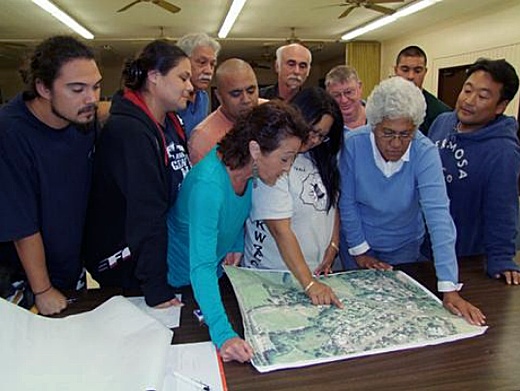 Image above: Kauai residents meet to discuss saving Koloa Camp neighborhood. From Joan Conrow article below.
WHAT:
Community meeting on ways to save Koloa Camp with state senator Hee.
WHEN:
Sunday on 11 march 2012 at 1:30pm
Image above: Kauai residents meet to discuss saving Koloa Camp neighborhood. From Joan Conrow article below.
WHAT:
Community meeting on ways to save Koloa Camp with state senator Hee.
WHEN:
Sunday on 11 march 2012 at 1:30pm
WHERE: Koloa Kauai Canoe Club This evening we finalized our plans for tomorrow's meeting with Senator Hee. We are going to gather at the canoe hale around 1:30pm. The Senator is bringing several of his staff people, and it is important to have him meet as many of the tenants, family members, and Wailani Road residents as possible. Friends and members of the KCA are welcome to help show the senator that we have community support. It is also our chance to ask the senator questions, and to firm up our plans. JoAnn Yukimura is supposed to attend. She is going to introduce her resolution this Wednesday to the County Council. Also, those that can bring food/drinks, please do so. See you tomorrow.
Neighborhood in Crisis By Joan Conrow on 6 March 2012 for Kauai Online - (http://www.forkauaionline.com/article/Local_News/Cover/Koloa_Camp_A_Neighborhood_in_Crisis_a_Neighborhood_in_Change/3325072)
Ask folks what they like most about living in Koloa Camp, and they'll answer without hesitation: the tight-knit community.
They also speak about the sense of history, and of place, that comes from living in century-old homes that previously housed Japanese field workers on the first sugar plantation in Hawai`i. As they see it, the boxy, metal-roofed relics from a bygone era do more than provide shelter. They also reflect a local lifestyle that is fast disappearing on Kaua`i.
So when Koloa Camp residents learned, via 120-day eviction notices sent out on Nov. 8, 2011, that their landlord, Grove Farm, planned to tear down their homes and build 50 new ones, they quickly banded together.
Families living in eight homes are affected, along with tenants renting five agricultural lots. They've been given until March 8 to vacate.
Camp residents began meeting every Sunday afternoon in the canoe hale that is also slated for demolition, and soon word of their plight spread to all points of the island. Folks showing their support for the residents packed the Koloa Neighborhood Center for meetings in December and January, when Grove Farm representatives detailed the company's plans to develop Waihohonu, named after the stream that flows near the camp.
Groundbreaking is scheduled for April, with construction expected to take about three years. Company officials said the project would provide affordable homes that are in big demand on Kaua`i.
Though Grove Farm offered to give Koloa Camp tenants the first chance to buy — the two- and three-bedroom houses range from 800 to 1,300 square feet and are tentatively priced at $230,00 to $485,000 — residents said they couldn't qualify for loans at those prices.
But mostly, they didn't want to see their neighborhood destroyed, leave homes where some had lived their entire lives, say goodbye to neighbors who felt like family.
“It's historically relevant and a valuable asset to this community,” says Kepa Kruse, who grew up in the camp. “It's what makes it old Koloa town.”
Eager to find an alternative, camp residents suggested the company instead build on land it owns on nearby Ala Kinoiki Road. But Grove Farm rejected the idea, saying the 6.5-acre proposed site was about half the size of Koloa Camp. Furthermore, it would take extensive time and money to change the zoning of the land from agriculture to residential.
Residents were beginning to get discouraged when developer Peter Savio stepped forward.
He had previously helped the residents of Poamoho Camp on O`ahu buy their houses when the Del Monte pineapple plantation shut down, and he thought a similar approach would work in Koloa.
“I'm here to give Grove Farm and everyone a way out,” says Savio, who offered to buy the camp at its appraised value, which is currently unknown, for the purpose of selling it back to the residents. “We're not asking for a discount or anything less than the market value. I really would love to see some of this history preserved. That's what excites me about these plantation camps.”
Grove Farm, which did not respond to a request for comment, formally rejected Savio's offer in mid-February.
But Savio, like the residents he represents, remains hopeful.
“I believe there's a lot of support on Kauai for saving the camp,” Savio says. “I do not see a local company strong-arming the community when there's an option like this.”
Added Kruse: “The camp residents are not moving.”
In keeping with that vow, they're making plans that center around staying, not leaving. They want to apply for assistance to preserve the historical structures, plant trees to stabilize the stream banks, create a community garden that will double as a hands-on learning place for sustainable living, and share their neighborhood with others.
“I see it as a chance to pass on a community, a historic camp, an `ohana, to the next generation,” says Koloa resident John Patt.
Update...
Residents of Koloa Camp have gotten the support of Hawai`i State Legislators in their bid to remain in their homes. On March 2, the State Senate approved a resolution calling upon Grove Farm to immediately put the evictions on hold and allow the Koloa Plantation Camp tenants to remain in their homes until alternative solutions are developed. The residents are supposed to be out by March 8.
The resolution also urges Grove Farm to engage in meaningful discussions with the tenants of Koloa Plantation Camp regarding the future plans for the plantation property and the development of alternative solutions.
The resolution, which is non-binding, now goes to the state House of Representatives for a vote.
.
No comments :
Post a Comment